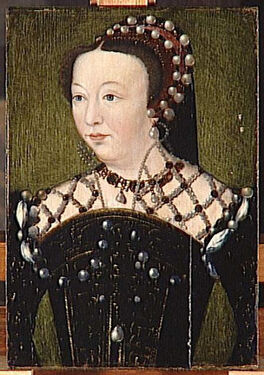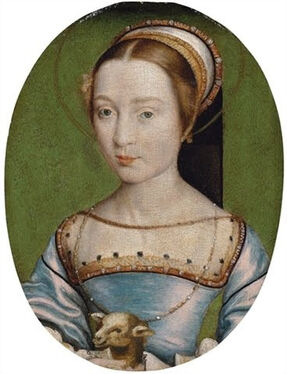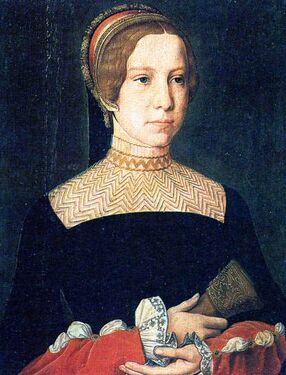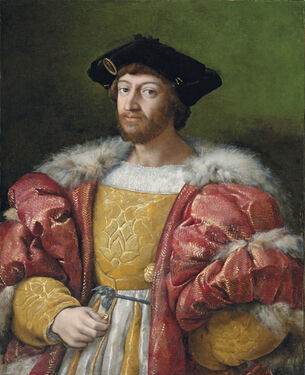Prince Francis, Duke of Anjou (March 18, 1555-June 10, 1584) was a Prince of France, Duke of Anjou, and the youngest son of Henry II & Catherine de Medici.
Early life
Prince Hercule Francois was born on March 18, 1555; he was the youngest son of King Henry II & Queen Catherine de Medici. His name was changed to Francis in honor of his late brother Francis II, upon his confirmation. Francis was an attractive child, until a battle with smallpox scared him and left deep pits on his face.
Heir to the throne
In 1574, following the death of his brother King Charles IX from tuberculosis, and the ascension of King Henry III Francis became the new heir apparent to the throne. In 1576 he was made Duke of Anjou.
Rebel Prince
On September 15, 1575, Francis ran away from French Court after having been alienated by his brother King Henry III. The King and their mother Catherine were worried about Francis joining the Protestant rebels, concerns which were well founded.
Francis had joined up with the Prince of Conde and his forces in the south. When they were also joined by the King of Navarre’s forces, following his escape from court in February 1576, this combined army was enough to force Henry III, without a pitched battle of any sort, to capitulate and sign the very pro-Protestant Edict of Beaulieu on May 6, 1576.
Sovereign of The Netherlands
In 1576, Francis negotiated the Edict of Beaulieu during the French Wars of Religion. Later in 1579, he was invited by William the Silent to become hereditary sovereign to the United Provinces. On September 29, 1580, the Dutch States General signed the Treaty of Plessis-les-Tours with the Duke, who would assume the title "Protector of the Liberty of the Netherlands" and become the sovereign.
Marriage to England?
In 1579, arrangements began to be made for Francis wed Elizabeth I of England. Francis, now Duke of Anjou, was in fact the only one of Elizabeth's foreign suitors to court her in person. He was 24 and Elizabeth was 46. The two soon became very close despite their age difference, Elizabeth dubbed him her "frog" on account of a frog-shaped earring he had given her. It is a heavily debated topic whether or not Elizabeth actually planned to marry Francis; however it is obvious that she was quite fond of him, knowing that he was probably going to be her last suitor. There was much opposition from the people of England as well as from Elizabeth's council, because Francis was a Frenchmen and a Catholic.
Between 1578 and 1581, the Queen resurrected attempts to negotiate a marriage with the Duke of Alençon, who had put himself forward as a protector of the Huguenots and a potential leader of the Dutch. However there continued to be opposition from England, the worst being that if Elizabeth married Francis then died without an heir then her crown would fall under French control.
Eventually, Elizabeth pragmatically did not judge the union a wise one, considering the overwhelming opposition of her advisors. She continued, however, to play the engagement game, if only to warn Philip II of Spain what she might do, if it became necessary. Finally, the game played itself out, and Elizabeth bade her "frog" farewell in 1581. On his departure she penned a poem, "On Monsieur's Departure", which, taken at face value, has lent credence to the notion that she may really have been prepared to go through with the match.
The Netherlands
Francis arrived in The Netherlands on February 10, 1582, where he was officially welcomed by William in Flushing. Unfortunately despite his pleasant welcome and his ceremonious installation as Duke of Brabant and Count of Flanders, Francis was not popular with the Dutch and Flemish who continued to see the Catholic French as enemies. Further, the provinces of Zeeland and Holland refused to recognize him as their sovereign. However, Francis was dissatisfied with his limited power, and decided to take control of the Flemish cities of Antwerp, Bruges, Dunkirk, and Ostend by force.
He would personally lead the attack on Antwerp, and on January 18, 1583, Francis entered Antwerp, but the citizens had not been deceived. The city militia ambushed and destroyed his force in the French Fury. Francis barely escaped with his life.
Failure and Insult
The attack at Antwerp marked the end of Francis' military career. His mother is said to have written to him that "would to God you had died young. You would then not have been the cause of the death of so many brave gentlemen". Insult further followed when Elizabeth I formally ended her engagement to him after the massacre. The Prince's position after this attack became impossible to hold, and he eventually left the country in June.
Illness and Death
Francis soon fell seriously ill with malaria. Queen Catherine brought her son back to Paris, where he was reconciled to his brother, King Henry III of France in February 1584. Henry even embraced his brother, whom he had famously called "Little Monkey", and on June 10, 1584, Prince Francis, Duke of Anjou was dead at the age of only 29. Francis' premature death meant that the Huguenot Henry of Navarre became heir-presumptive, thus leading to an escalation in the French Wars of Religion.
References
- https://en.wikipedia.org/wiki/Francis,_Duke_of_Anjou.
- https://www.britannica.com/biography/Francois-duc-dAnjou









